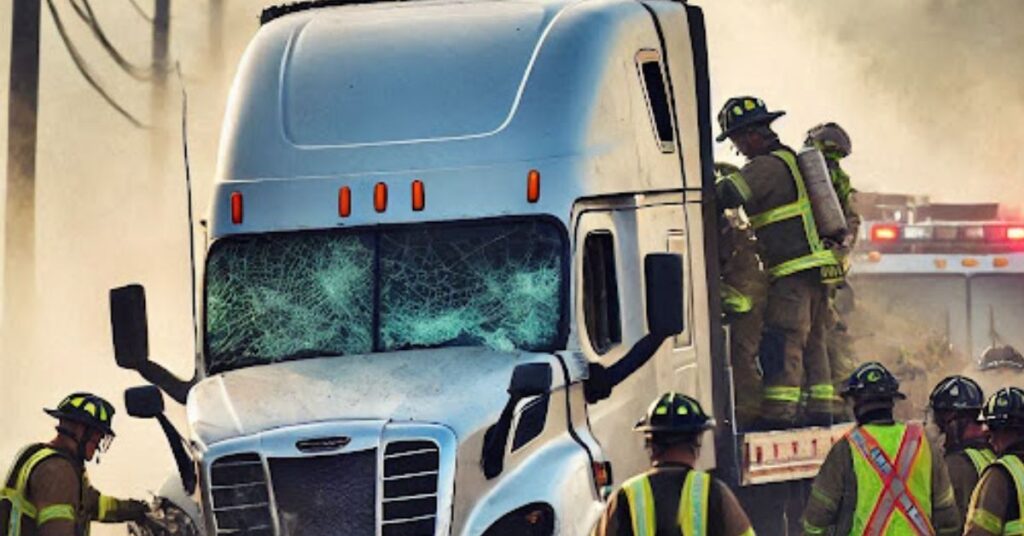The aftermath of a truck accident can feel overwhelming. The sudden shock, physical injuries, and confusion leave little room to think clearly.
However, what you do next could shape the outcome of your recovery and any legal action. From documenting evidence to ensuring your safety, each step plays a role in protecting yourself physically and legally.
This guide breaks it all down into manageable steps. Take the right actions now so you’re prepared for later challenges – starting with what matters most.
1. Ensure Safety and Prevent Further Harm
Your first priority is to stay safe. Move your vehicle out of traffic if possible, but only if it’s safe to do so. Turn on hazard lights, and set up flares or reflective triangles if you have them.
It’s the same thing as blocking off a construction site – you’re keeping everyone else away from danger while avoiding more damage yourself.
Stay calm, assess injuries (yours and others’), and don’t play the hero unless it’s absolutely necessary. Your health matters most!
2. Contact Emergency Services Immediately
Call 911 right away – don’t assume someone else has already done it. Provide clear details about your location and any immediate hazards at the scene.
Emergency responders are like an all-in-one tool for accidents: they secure the area, help anyone injured, document the situation thoroughly, and ensure legal processes kick off correctly.
Plus, their official reports will be invaluable later when handling insurance or other claims down the line!
3. Gather Evidence at the Scene of the Accident
Think of yourself as a detective for a moment. Take pictures of everything – vehicle damage, license plates, skid marks, road signs, weather conditions, and injuries (if safe to do so). These snapshots are your proof when memories fade or stories change.
Exchange contact and insurance details with others involved, but avoid lengthy conversations about fault. Even casual remarks like “I didn’t see you” can come back to haunt you later.
If witnesses stop to help, grab their names and numbers too – they’re your real-life backups!
4. Seek Medical Attention as Soon as Possible
Even if you feel okay now, get checked out by a doctor promptly. Injuries like whiplash or internal trauma often hide behind adrenaline until hours – or even days – later.
Medical records also act as evidence if you’re filing claims later on. Skipping this step could give insurers an excuse to argue that your injuries aren’t related to the accident.
Treat this visit like hitting “save” in a game – it locks in important data for future use!
5. Notify Your Insurance Provider Promptly
Contact your insurance company as soon as you can, but stick to the facts. Share only what’s necessary: time, location, and basic details of the accident. Let them know if law enforcement or emergency responders were involved.
Avoid giving recorded statements right away unless you’ve consulted an attorney first – insurance adjusters are trained to minimize payouts by using your words against you.
Think of this step like filing a warranty claim; get it on record early for smoother processing later!
6. Be Careful with What You Say to Authorities or Others Involved
Choose your words wisely when talking at the scene. Give honest answers to police officers without speculating about fault or filling in gaps you’re unsure of – stick with “I’m not sure” if needed.
When speaking with other drivers or witnesses, avoid saying anything that could be interpreted as admitting guilt, even casually. Phrases like “I didn’t see you coming” might seem harmless now but could cause issues down the line.
This is one of those times where less truly is more!
7. Consult an Attorney Specializing in Truck Accidents
Once the immediate chaos settles, reaching out to a lawyer is crucial. An attorney experienced in truck accidents understands the complex regulations and can guide you through every step of filing a legal claim after a truck accident.
They’ll ensure deadlines are met, evidence is properly used, and insurance companies don’t take advantage of you. Think of them as your personal navigator – helping steer your case toward fair compensation while you focus on recovering.
It’s one step that could make all the difference!
Key Takeaways to Keep in Mind
- Safety first: Secure the scene and call 911 immediately.
- Document everything: Photos, witness details, and official reports are your strongest tools later.
- Prioritize health: See a doctor, even if you feel fine – hidden injuries can surface later.
- Be cautious with words: Avoid admitting fault or making speculative statements.
- Seek expert help: An attorney can strengthen your legal claim after a truck accident.
Each step builds toward protecting your rights and recovery!
Preparing Yourself for What Comes Next
Taking these steps immediately after a truck accident helps protect your health, legal rights, and peace of mind. With the right approach and professional guidance, you’re setting yourself up to recover physically and financially while moving forward with confidence.







